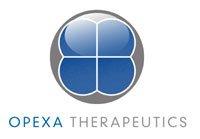
September 18, 2006 08:00 AM Eastern Time
BIOWIRE2K
THE WOODLANDS, Texas--(BUSINESS WIRE)--Sept. 18, 2006--Opexa Therapeutics, Inc. (Nasdaq:OPXA), a company involved in the development and commercialization of cell therapies, today announced a number of positive steps in the Company's development including:
-- Its Phase IIb study with Tovaxin(TM) for the treatment of multiple sclerosis has begun. More than 90 attendees from 35 clinical sites attended the investigators' meeting held recently in The Woodlands. These sites have begun screening patients for the 150-patient trial. Opexa expects that the first patients will be enrolled early in the fourth quarter of this year.
-- Positive data from the Phase I/II trial with Tovaxin in multiple sclerosis indicate that after 12 months, patients exhibited a relapse rate reduction of more than 90%.
-- Initiation of animal studies at the University of Texas Medical Branch at Galveston utilizing the Company's autologous adult human stem cell regenerative medicine platform technology.
Commenting on the Phase IIb study, Edward J. Fox, M.D., Ph. D., Clinical Assistant Professor, University of Texas Medical Branch, and director of the MS Clinic of Central Texas (Austin), the lead principal investigator for the Phase IIb study said, "The investigators at the kick-off meeting held in late August expressed a great deal of enthusiasm for this trial and were ready to begin screening patients. We are optimistic that this trial will advance our understanding of Tovaxin as a possible safe and effective treatment for Multiple Sclerosis."
As previously announced, this Phase IIb clinical study will include 150 patients in a multicenter, randomized, double blind, placebo-controlled trial designed primarily to evaluate the efficacy, safety and tolerability of the Tovaxin T Cell vaccination with clinically isolated syndrome (CIS) and relapsing-remitting MS (RR-MS) patients. A total of 100 patients will receive Tovaxin, while 50 will receive placebo. The study is designed as a two-arm, 52-week, parallel-group study, whereby patients will be given five subcutaneous injections at 0, 4, 8, 12 and 24 weeks. The analyses will be performed at the end of the 52-week study to assess the safety and efficacy of Tovaxin. The primary efficacy variable is the cumulative number of gadolinium-enhancing lesions on T1-weighted MRI summed over the Week 28, 36, 44, and 52 MRIs. The secondary efficacy variables are the cumulative number of new gadolinium-enhancing lesions at Weeks 28-52, the change in T2-weighted lesion volume, and the annualized relapse rate.
All patients who complete the trial will be eligible to participate in an optional one-year extension study, in which they will receive Tovaxin open-label. The open-label study is being planned under a different protocol that will be submitted to the FDA.
David McWilliams, president and chief executive officer of Opexa said, "We are pleased to begin this trial and based on recent data from our Phase I/II studies, we believe that those early results support the rationale for moving forward. We now have 12-month data from our two earlier studies, which indicate that the patients treated had a greater than 90% annualized relapse rate reduction, as compared with their prior history."
Opexa also announced that it has advanced its preclinical program in diabetes with the initiation of animal studies at the University of Texas Medical Branch at Galveston. These studies will utilize Opexa's adult human stem cell regenerative medicine platform technology. This is a novel process that utilizes a specific set of conditions in which monocyte-derived stem cells are able to differentiate into insulin-producing islet-like clusters. This process offers several distinct advantages over present adult stem cells technologies for diabetes. One promise of this technology is the ability to easily isolate stem cells from an individual's circulating monocytes (white blood cells), expand and differentiate them into insulin-producing islet-like cluster and administer them back into the same patient. This autologous approach has the advantage of avoiding the problem of transplant rejection and may eliminate the need for immunosuppressant drugs which are often associated with current transplantation. Data from the animal studies are expected in the first quarter of 2007.
About Opexa Therapeutics
Opexa Therapeutics develops and commercializes cell therapies to treat several major disease areas such as MS, rheumatoid arthritis, pancreatic and cardiac conditions. Opexa has exclusive license from Baylor College of Medicine for individualized cell therapies and has initiated a Phase IIb clinical trial to evaluate effectiveness in treating MS. The Company holds the exclusive worldwide license for an autologous T cell vaccine for rheumatoid arthritis from the Shanghai Institutes for Biological Sciences, Chinese Academy of Sciences of the People's Republic of China. Opexa also holds the exclusive worldwide license from the University of Chicago, through its prime contractor relationship with Argonne National Laboratory, for patents relating to the use of adult pluripotent stem cells derived from patients' own circulating blood. For more information, visit the Opexa Therapeutics website at www.opexatherapeutics.com.
Safe Harbor Statement
This press release contains "forward-looking statements," including statements about Opexa Therapeutics' growth and future operating results, discovery and development of products, strategic alliances and intellectual property, as well as other matters that are not historical facts or information. These forward-looking statements are based on management's current assumptions and expectations and involve risks, uncertainties and other important factors, specifically including those relating to Opexa Therapeutics' ability to obtain additional funding, develop its stem cell technologies, achieve its operational objectives, and obtain patent protection for its discoveries, that may cause Opexa Therapeutics' actual results to be materially different from any future results expressed or implied by such forward-looking statements. Opexa Therapeutics undertakes no obligation to update or revise any such forward-looking statements, whether as a result of new information, future events or otherwise.
©2005 PharmaFrontiers Corp. All Rights Reserved